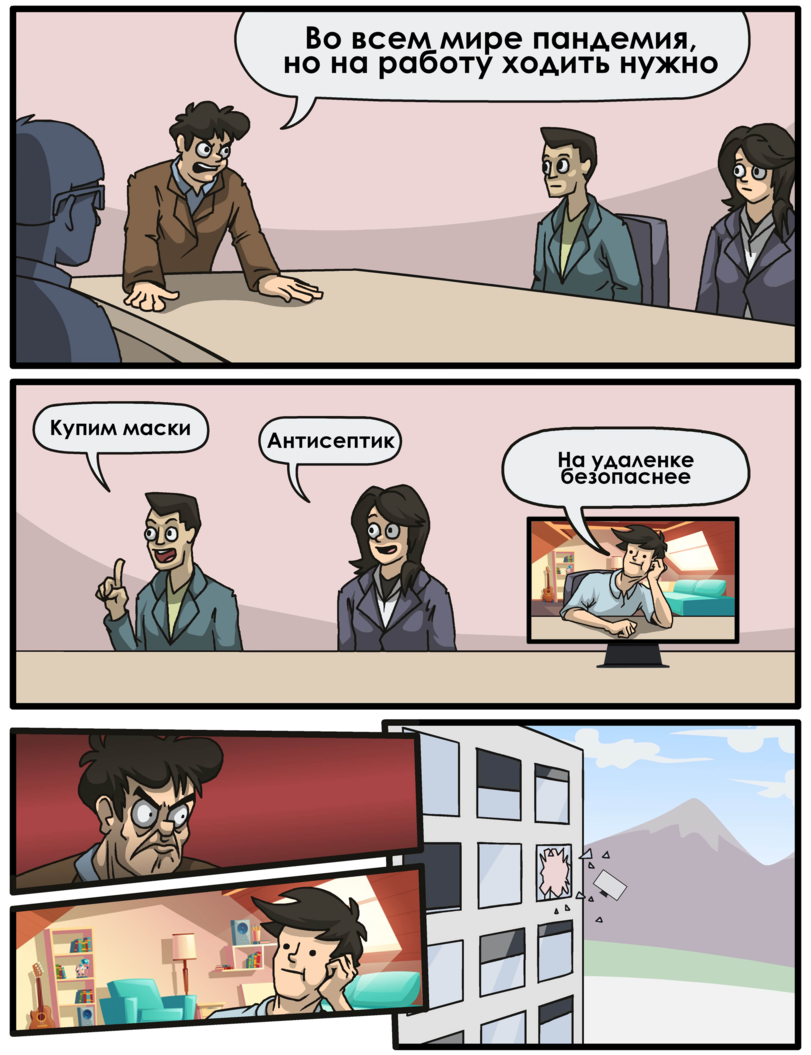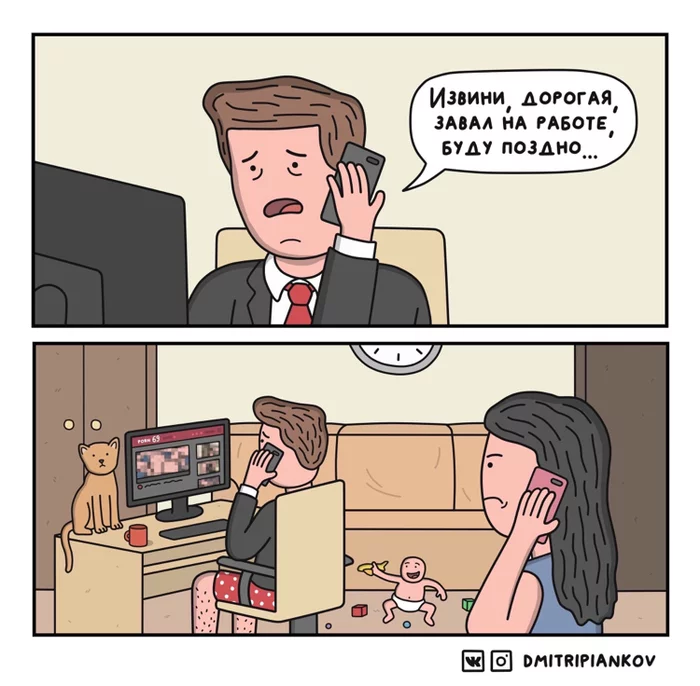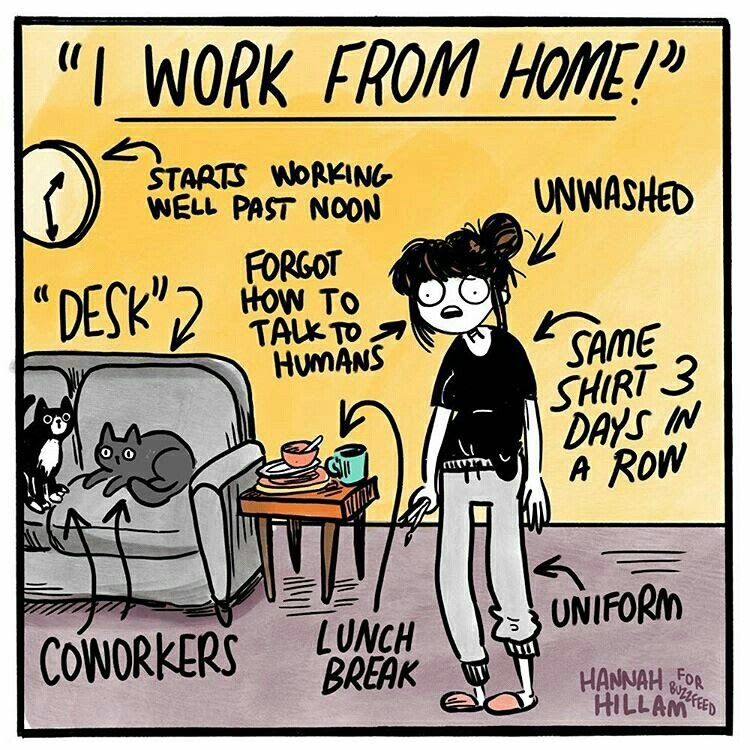Now business activity is beginning to revive very slowly - while it is a threadlike pulse, but at least not a cardiac arrest. And one of the main subjects of controversy remains remote work (remote work, WFH). Basically, the advantages and disadvantages of this form of work for employees are discussed. But there are very few materials about what will happen to the companies? Do they set themselves a trap, making the distance fashionable? We suggest starting a discussion.

We develop and implement our RegionSoft CRM CRM system - and for all 14 years we have been working with clients all over Russia and other countries remotely: remote support, installation, implementation, training and revision take place without problems. Despite the fact that we are IT specialists, we have only two remote workers on the staff, and they are not programmers, but rather remote workers by circumstances. But during self-isolation, we were no exception and worked from home almost until the end of July, returning to the office one day. And, to be honest, it is difficult to share both the enthusiasm for the distance and her total censure. One thing cannot be denied: remote work has many pitfalls for companies and you need to learn how to bypass them in order not to go to the bottom. Well, or choose a different fairway.
- ?
-, — 31 ( 15 000 )! - 20
Some of the arguments from companies are valid, and some rest either on a false idea of working from home or outright dishonesty towards employees. For example, one Russian company allows its employees to work from home 2 days a week, but the day before the head of the department asks for a detailed work plan for these days, reviews and approves it. That is, the first step begins with distrust.
So, about the benefits.
The right shots are available more than ever
The first and most important, indisputable advantage applies to IT companies and to a lesser extent all the others. Working in a distributed team mode erases the boundaries of recruitment and allows the selection of suitable personnel almost all over the world. Moreover, it is not uncommon for good programmers to settle for a slightly lower salary, knowing that by working remotely, they will not only be able to reduce the workload, but also pull on a couple of side projects. In addition, it is quite easy to fit a developer into workflows - he receives specific tasks and is expected to write high-quality code on time. Small online meetings during the working week are enough to coordinate all the work of such a team. The same benefits apply to devops, testers, security guards and, to a lesser extent, designers.
But then very controversial statements begin, which for some companies are not relevant in principle.
No office costs
The adherents of remote control claim that you can bear zero rubles of expenses for rent and maintenance of an office, for utilities, office equipment, stationery, peripherals, software, water, and so on. Thanks to this, the company reduces costs and increases profits. Here in this place I sincerely hope that those who write this in various expert articles are only consultants and dump trucks that did not drive the business, do not drive and will not drive.
Firstly, the existing office is not easy to "dump". If it is owned, it must be disbanded and sold; if it is rented, it must be disbanded and abandoned. but
this is a controversial decision, since many companies communicate in the office with clients and clients are accustomed to offline contact with the performer. Secondly, in the overwhelming majority of companies there are employees who want to work from the office for their own reasons - and to refuse them means losing them.
As for office costs, it seems that our opponents forget that employees at home also need a computer, a printer, rented VPS / VDS, Internet, communications, antivirus, office and work software, a telephone, a headset, paper and other stationery, a desk chair and a work table (you won't last long on the kitchen table and stool - it's checked!), and some also have a printer, scanner, copier, test equipment, flash drives, modems, etc. And hardly any employee will be terribly happy with such purchases at their own expense (although this happens, alas). Moreover, the costs may even increase due to the fact that a specialist is needed for field service of this fleet of equipment + transport for it, as well as some office equipment will have to be bought in several copies (for example, if there was one printer per office before, now it will need 4 5 employees;the same story with test equipment, scanners, etc.). Plus, the costs will be added to the subscription fee for programs and applications for collaboration and remote work with clients. So the remote site has its own serious economy, it is not a free format.
Employees do not take time off and sick leave
If an employee works from home, he does not need a day off and does not need a sick leave - this is what some experts and even company executives believe. According to their logic, a person does not lose a minute of his working time. Experts cite an old Stanford study that found remote workers were less likely to take sick days.
Now let's figure it out. If a person in the office needs a day off or sick leave, what does he do? That's right: he takes time off or takes a certificate of incapacity for work from a doctor and is absent from work, doing his business or conducting treatment and knowing exactly the cost of this absence. Everything is fair: the day off will not be paid or worked on a day off in the office, sick leave is paid at the rate set according to the length of service (three days are paid by the employer, and the rest of the days according to sick leave - at the expense of the social insurance fund). And what does a remote employee who “takes less time off and sick leave” do? Honest - acts according to the old scheme, and cunning - calmly does things for which they needed time off, or is treated (if the disease is not dangerous), while being forced to do his job on the run, mixed with other things, that is, quite badly.Moreover, his work is fully paid by the employer. Draw your own conclusions.
Employees have a perfect work life balance
It is believed that an employee who works from home spends a lot of time with his family, thanks to which the mood, loyalty, appetite and complexion improve incredibly. According to experts, contact with loved ones and the lack of time to travel allows the employee to relax, play sports and hobbies, lead his own project, watch TV series and enjoy life.
I have one question - how did these people avoid self-isolation and did not feel the set of the listed advantages on their own skin?
In short, only appetite improves - against the background of severe stress and eternal twitching, because it is extremely difficult to work when family members are at home and when they all need everything from you at once (and it does not matter at all who they are - spouses, children or parents. , be kind to be homely). The balance of work and personal life is collapsing completely, and in two directions: either a person goes headlong into work and plows for 16 hours (by the way, it seems, quite often), or he scores on work and performs only basic tasks at an acceptable level, so that do not get burnt. Sometimes these phases alternate. The majority does not form any skills of a highly effective person, the exception is people with iron discipline and motivation, who work hard in the office without any complaints.Disrupting the balance leads to conflicts in the family or at work and ultimately reduces productivity even more.

Author's Instagram
Yes, our roads and traffic jams are still fun, but this time is a chance to psychologically switch from problems at home / at work and come to work / home already in a normal mood. In addition, both family and work are an outlet for a person, which allows you to cut some small knots of problems with a respite from a distance. In the case of working from home, the conflict with either side is not smoothed out, but escalated.
Some advanced employers have adopted foreign experience and went further: HR specialists develop programs for building work life balance of their colleagues and implement them, creating additional motivation. I translate into human language: HR-s seek out recommendations, draw up them, cross the last border, climb into the life of employees and, not knowing the details, plant a new “remote” corporate culture. Needless to say about the reaction to such actions?
“What I miss is when you go to a physical meeting, you talk to the person next to you, you can talk to him for two minutes before and after. [...] I feel that perhaps by working remotely, we are burning up some of the social capital. "Remote work outside of medical measures and other emergencies should not remain the main format, but exclusive or motivational. When is partial retirement a blessing for the company and its employees?
Satya Nadella, CEO of Microsoft
- If it is voluntary and not uncontested, that is, the employee can choose where he will comfortably and effectively fit into the business process: at home or in the office.
- If we are talking about an experienced employee in whom you are confident, but he cannot continue to work in the office due to relocation, illness, pregnancy, family circumstances. You meet halfway and your reliable employee will answer you with gratitude and responsible work.
- If you need to work with valuable specialists from other regions.
- , . - , , .
- , , ( ) , .
- , (, , ).
At the same time, the company must clearly understand that a remote worker, drawn up under a full-time employment contract, is a full-time full-time employee of the company with all rights and obligations, including the right to be informed about the company's affairs and projects, the right to information security, the right to promote career ladder, etc.
And now about the cons
So, with the positive aspects and their risks, we figured out a little, now let's talk about what will happen to the company if it decides to take away most of its office life to employees' homes.
Cons for the company
Employee retention plummets
When enough time has passed since leaving the company, most employees wean themselves off the company. They lose their moral connection with colleagues and friends at work, with the workplace, with work equipment, with cute traditions of morning coffee and Friday pizza, with short meetings, etc. In fact, a person becomes a performer of work and does not feel his involvement in the company, he no longer has motives like “The salary is so-so, but the team is sincere and dear”, “How can I let my colleagues down”, “Oh, I will miss our meetings” and etc. Now there is only him, work tasks and wages. Exactly the same, only 10n thousand rubles more can be offered by other companies, so all non-material motivation disappears. Most of the measures to retain an employee lose their meaning, and the only measure is the ability to work remotely.If this trump card is bit in the vector of the employee's interest, consider that you have lost it.
However, I hasten to console you: I know of cases when employees are sincerely loyal to the company and carry its ideology and mission even after years of retirement. But this requires an important condition for the leaders and top managers of the company - not to be assholes and goons and at the same time not to be an object of manipulation. Difficult balance, but reassuring to see it meet.
You have competitors in the labor market
These are other companies that hunt your employees, and other companies that… your employees work for. In principle, there is nothing wrong with side projects - on the contrary, if you give an employee the right to do something else in another company outside of working hours, this can bring an interesting synergistic effect: he will carry new ideas and visions of problems back and forth, this is pleasant intellectual "expansion".
However, together with synergy, the employee will involuntarily compare his projects, evaluate tasks and motivation, strive to win a position somewhere, etc. This is a slippery and complex topic and the only way out of it is to talk to the employee directly, ask the correct questions and make sure of his decency. As a rule, productive workaholics who choose 2-3 jobs at the same time are able to deliver good quality in the right amount on all three. Make allowing side-projecting your unequivocal competitive advantage and a tool of motivation and retention. By the way, the same applies to cases when an employee organizes his business (not threatening you, of course) - while he is doing his job at a good level, close your eyes and watch.
Security and infrastructure is a huge issue
You probably already realized this when you moved to a remote location in March-April. Not all employees have a good technical background in order to establish the operation of technology at home, especially in non-tech companies. Therefore, breakdowns, freezes, blue screens, hair-eating printers, non-working programs, Internet, telephony, etc. will become a big problem. You will either have to hire a system administrator on your personal transport, or pay after the fact for the services rendered by private masters, who will be contacted by employees. In the end, both cost options will unpleasantly surprise you.
When it comes to security, remote is enemy number one. Your business and commercial information will be threatened by everything: from a three-year-old who poked in 1C while his mother was cooking porridge, to an employee who wants to voluntarily and irrevocably hand over the client base to competitors. At home, a person is in a safe territory for himself and significantly loses vigilance against the background of the growth of the human factor. Therefore, it is worth considering protection from possible problems (and this is again a rather big cost).
It's hard to spot a bad employee
And this is a very dangerous trap. You risk not seeing a bad employee among the newly hired on the one hand, and you risk not seeing your bad one on the other. The fact is that a good and responsible office employee can turn into an outspoken bummer and procrastinator at home, simply because he has such a temperament: he does not work without pressure, even if you crack. The roots of this behavior of a normal, in general, professional can go back to the times when he did his homework under the watchful eyes of his mother or grandmother. He just got used to control, this is his condition for efficiency and concentration. So, for a long time you will not be able to identify such a person because of the high credit of trust for previous merits.
Well, besides this situation, which was worth describing, you should understand that any manager who is bad or violates the rules of work at a remote location can go unnoticed for a long time. It will take a major effort on the part of the HR department and manager to establish a mechanism for detecting and correcting such precedents.
Lack of trust
Unfortunately, a lack of trust will haunt the company everywhere: the manager will not trust the subordinates, the subordinates will wait for strange org. decisions from the head, the employees themselves will stop trusting each other. Due to the information hunger and many points of uncertainty, everyone will become "one warrior in the field" and will vigilantly guard their positions, entering into conflicts and escalating every minor problem to the scale of a catastrophe. Newcomers will join the pool of “untrusted”, since neither colleagues nor the manager will be able to remotely understand what kind of employee they have hired. And it's not even a matter of professionalism - even at the very early stages of the probationary period, you will not be able to see what a person is in a business turnover, whether he is used to being late, how long his breaks are, what kind of character he is and how much he shares the values or at least the goals of the company.
The only way to partially avoid this problem is to work remotely with an old, proven team, which also showed itself perfectly in the office. However, this is also temporary: someone will surrender to the temptations of being removed, someone will find another job and need to be replaced, someone will burn out against the background of overwork. Do not assume that you remotely manage exactly the same team that you had in your office before.
Partial retirement is a subject of conflicts and discontent in the team
Some companies choose telecommuting as a format of work for certain groups of employees. It's great if these are employees who objectively need such a format, it is worse if remote work becomes a measure of reward. In such cases, conflicts, complaints and accusations are inevitable. Therefore, do it simply: either retirement is an exclusively compulsory measure, or it is completely voluntary. But in general, from the point of view of employee loyalty, remote Friday is seen as an ideal option for everyone: those who want to go to the office, but this opportunity is open to everyone. Thanks to the remote Friday, employees will be able to quickly get to the place of rest, “stop by” at the weekend and thus have a better rest and return to the office in full vigor and with a bag of loyalty on Monday. I know that such a practice exists in large companies and banks - a positive experience.

Do remote users have remote dreams in ZOOM?
Employees are difficult to control
Remote work is fraught with procrastination, temptations like TV shows and culinary hobbies, and the proximity of other non-work activities. Moreover, for some of these activities, a person feels a duty, exactly the same as for work. Accordingly, the priorities will change and it will take time for them to settle down in line. At this time, the company completely loses control over its employees. Elementary: YouTube is much more pleasant to watch when there is no chance that the chef will approach you. Fingers completely forget the Win + D combination and calmly hammer in the names of interesting, but not related to work sites. By yourself, honestly, by yourself.
One can object to me: yes, let them do what they want, if only the work is done. And I completely share this idea. However, the human brain is highly adaptable and lazy, so it will certainly pull the owner to the place where the center of pleasure is activated - and in this battle Netflix wins the program code and sales reporting. A good help for soft control of a distributed team of task management systems and CRM systems , in which you can see the work actually done literally by the hour. This is important to maintain organizational integrity and the pace of the workflow.
But what I strongly do not recommend using is time trackers, camera traps and other physically and programmatically controlling rubbish. Respect your employees and yourself, otherwise it turns out somehow hypocritical: you snort at all sorts of social monitoring and QR codes, and you yourself deploy software that makes screenshots every three minutes or forces an employee to catch a pixel picture with a mouse.
Routine work performed worse
There is such an observation: routine work on a remote location is performed worse, and creative work is better. Routine, monotonous work without inspiration (sales, reports, entering data, marking up datasets, etc.) is an uninteresting, sickening environment and a person almost unconsciously begins to leave it in comfort: snacks, cats and dogs, children, for a long time not transplanted flowers and not assembled constructor. This factor must also be taken into account when planning remote work.
Personnel do not grow
It is always difficult to find a person who, if something happens, you can put on management positions in the company or entrust him with the most difficult and responsible work. When a team is fully distributed for six months, a year, or two, it is almost impossible to find real “stars”, because employees do not have the conditions to prove themselves as a leader, as a manager, as a team player. A brilliant performer of all tasks can be a lousy leader, and a perfectionist and a great strategist can be hiding behind a gray employee with overdue tasks. If they haven't shown themselves yet in the office or you've recently hired them, you can easily make a mistake with the choice.
Good talent only grows in an office environment, in an environment of micro-conflict and compromise, in the background of communication with senior experienced employees and immersion in the spirit of the company. At a distance, all this is leveled.
Hiring changes face to grin
For a company that is not adapted to telecommuting, hiring staff using remote tools is quite a difficult experience, since neither the HR nor the manager is ready to consider people outside the context of live communication. Thus, one facet remains - the professionalism of a person, which can be assessed by portfolio, work experience and results in previous positions. However, professionalism is cool, but soft skills allow a person to fit into the team and become a full-fledged player. Alas, it happens that a professional just doesn't fit the team. I want to emphasize: he is not a sociopath, he is not toxic - what kind of assessment is this! It's just that this Person is not suitable for this particular Team, there is no special corporate chemistry. This is exactly what ZOOM does not work out.
The situation is even worse with graduates and interns - it is almost impossible to involve them in the company remotely. If they start their careers from remote work, it will spoil them as future professionals, because it creates a distorted understanding of the essence of work and interactions. Yes, and taking an inexperienced beginner, and even remotely - the madness of the brave. This is, perhaps, the most dangerous thing about distance in HR. Still, a new, young employee should be formed with the assistance of a mentor, mentor, inside office life and communication with colleagues.
Cons for an employee
Lack of technical support
There are always employees in the office who will help with problems with office equipment and software: depending on the size and model of the business, these can be outsourcers, a system administrator, just a smart colleague or even a company manager. It is enough to call or leave a record of the incident and help will come. Remote work destroys this advantage - and if an employee with a computer is "you", every problem will terrify him and lead to fundamental downtime.
It seems like a small thing, but no. For us, the developers of the CRM systemas no one knows how modern business is tied to technology (we are not even talking about automation, just a normal operational process!) - from an accountant and marketer to department heads and salespeople. Any simple team member ruins the whole process (sometimes more than one), and this entails a loss of time, sometimes even customer loyalty or money. Such "distributed" support may cost a company more than the same in the office, it will seek to save money, the employee will feel "dumb", productivity will decrease, etc. In general, a frozen 1C or dead Windows can bring the same "butterfly effect" to the company.
24 hour working day
Remote work is not only pleasant, but also around the clock. In general, the nature of remote processing is associated with three main factors:
- (, ), --, 6 ;
- , - , - .. ;
- , , .

If you do not adjust the mode of work from home, you can fall into an unpleasant trap and feel like a squirrel in a wheel. There is only one way out: discipline and time management. Without these two things, telecommuting will cripple the nervous system and significantly reduce the ability to make decisions, work productively, and respond appropriately to colleagues. This will be a burnout that can lead to depression.
Procrastination
Procrastination is the process of constantly distracting an employee with anything other than their main job. Important and urgent matters are constantly postponed, which leads to even greater difficulties and the circle closes. This is not laziness, this is a defensive reaction, a subconscious unwillingness and fear to take on a difficult or new business. Remember how you were ready to wash the floor and dishes, just not to learn the lessons - this is exactly the feeling of a joyful desire to do something different and a sad feeling of guilt. Procrastination can go too far, so you need to learn to get pleasure from work, from new tasks, from immersion in the intellectual process. This is easier than it sounds.

Perception within society is impaired
When you and I are in a team in the office, perception goes through all the senses: we see facial expressions, technology does not distort the intonation and nuances of the voice, we feel the mood of colleagues, we can even assess the mood by appearance, gestures, postures, behavior. This creates empathy, facilitates the exchange of ideas, builds up a dialogue, the team gains additional value as a human community.
At ZOOM everyone is always tense, with a smile and a lot of attention to their second chin. Video conferencing and chats generate limited perception of team members, do not allow empathy to work - you can easily notice this from the awkward pauses during online communication. Plus, the state of connection and technology takes away some of the attention from the interlocutors, it is uncomfortable to communicate and you want to constantly ask “can you hear me? is the screen visible? " Therefore, online meetings are more like a clock check than a quality brainstorming session or productive discussion. It is difficult to build a working dialogue online, all mistakes are comprehended with practice.
Remote work is still a moral issue
If some of the employees work remotely, colleagues may consider them bums, freelancers and “underworkers”. They clearly offer to take on a couple more tasks, because "well, you sit at home there, look a little, you have time at home." And in such insinuations, there is often a fault of the head who separates the office "close" and remote "distant". By the way, you shouldn't hesitate to complain about such statements before they go too far.

And this is in addition to the constant pressure from relatives who constantly ask when you will find a normal, real job. And this despite the fact that the work takes more time, you try and get real money for it. Sometimes resentment can even push you to change jobs.
An employee may find their advantages and disadvantages of telecommuting and accept or reject the way the company operates. But you should always remember that there may be people on the team for whom remote work is categorically unacceptable.
Cons for clients
This will be a very small point. Any negative within the company, misunderstanding of the principles of work, difficulties in communication will sooner or later lead to problems with the product and customer service in any company. Therefore, remember that internal processes determine the level of loyalty of your customers. By the way, the CRM system solves most of the problems with clients remotely and organizes the operational work of the team well - the introduction of an increase in productivity and has a positive effect on business processes.
If remote work is already a resolved issue
If your company is forced to work remotely or decided to experiment, we have some tips on how to avoid major problems.
- . : 80% , 20% — , , , .. ( ) , .
- , , .
- . , , , - (, , - ).
- : , . .
- , , , .
- , .
And the main advice is probably one: stay human.
There are fears that massive remote work in 2020 will affect business in 2021: many products, solutions and services will enter the market and update later than the market expects. Social disunity will lead to communication problems within the team, a lot will have to be rebuilt and laid down anew. The remote worker has many advantages and supporters, you can even joke that she has a strong IT lobby, but I am sure that remote work is also a drop in productivity, productivity, and a serious psychological burden for employees and the manager. I don’t want to be a pessimist, but I believe that soon we will see articles on Habré about how companies have suffered damage from remote control. If, of course, someone decides to be sincere and admit that the format did not work.
If you have doubts and want to know how good your business processes are, we are ready to conduct a free audit of them until August 31 and offer CRM mechanisms for their automation (usually such an audit costs from 15,000 rubles). Our experts will conduct a series of interviews with your employees and answer your questions. Considering that the experience of experts in business and automation is over 20 years, it's just fun and useful to talk to them.
